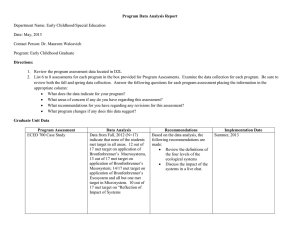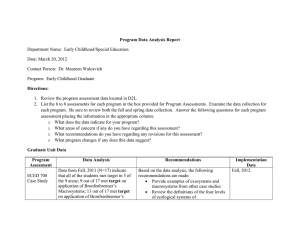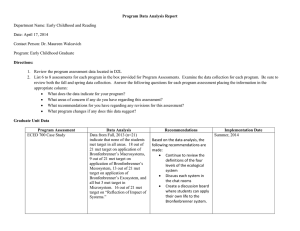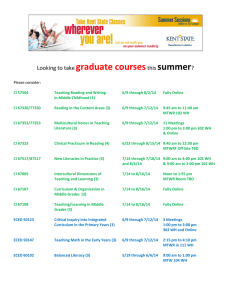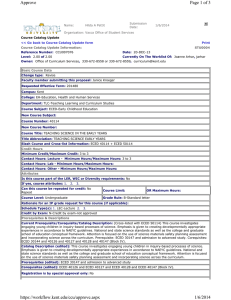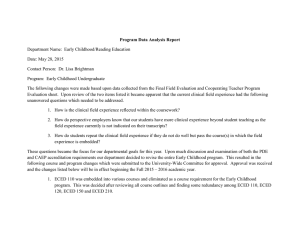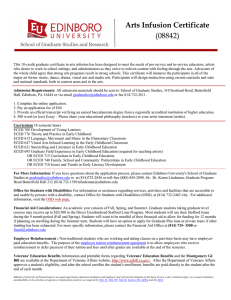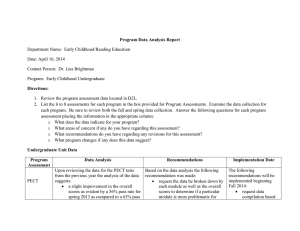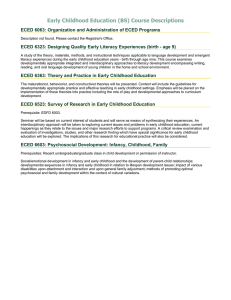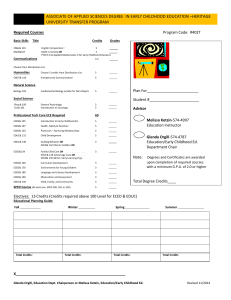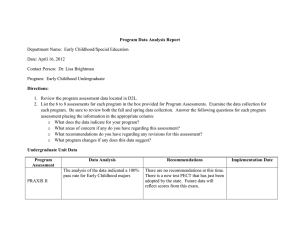Graduate Program Data Analysis Report Date: September 4 , 2015
advertisement
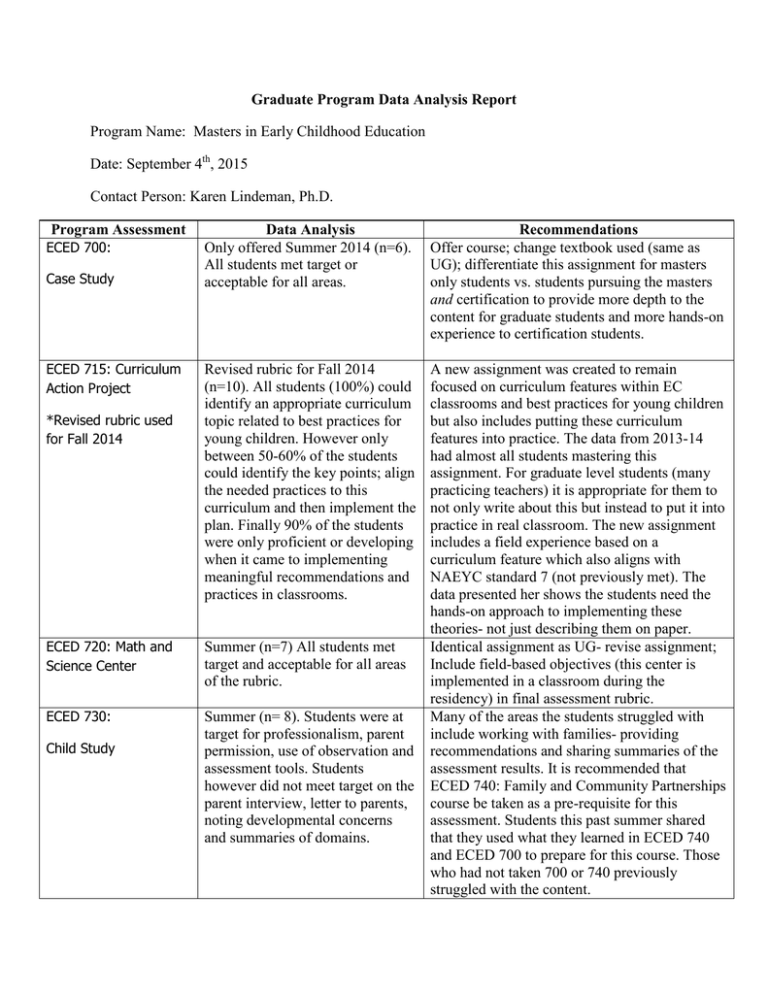
Graduate Program Data Analysis Report Program Name: Masters in Early Childhood Education Date: September 4th, 2015 Contact Person: Karen Lindeman, Ph.D. Program Assessment ECED 700: Case Study ECED 715: Curriculum Action Project *Revised rubric used for Fall 2014 Data Analysis Only offered Summer 2014 (n=6). All students met target or acceptable for all areas. Recommendations Offer course; change textbook used (same as UG); differentiate this assignment for masters only students vs. students pursuing the masters and certification to provide more depth to the content for graduate students and more hands-on experience to certification students. Revised rubric for Fall 2014 (n=10). All students (100%) could identify an appropriate curriculum topic related to best practices for young children. However only between 50-60% of the students could identify the key points; align the needed practices to this curriculum and then implement the plan. Finally 90% of the students were only proficient or developing when it came to implementing meaningful recommendations and practices in classrooms. A new assignment was created to remain focused on curriculum features within EC classrooms and best practices for young children but also includes putting these curriculum features into practice. The data from 2013-14 had almost all students mastering this assignment. For graduate level students (many practicing teachers) it is appropriate for them to not only write about this but instead to put it into practice in real classroom. The new assignment includes a field experience based on a curriculum feature which also aligns with NAEYC standard 7 (not previously met). The data presented her shows the students need the hands-on approach to implementing these theories- not just describing them on paper. Identical assignment as UG- revise assignment; Include field-based objectives (this center is implemented in a classroom during the residency) in final assessment rubric. Many of the areas the students struggled with include working with families- providing recommendations and sharing summaries of the assessment results. It is recommended that ECED 740: Family and Community Partnerships course be taken as a pre-requisite for this assessment. Students this past summer shared that they used what they learned in ECED 740 and ECED 700 to prepare for this course. Those who had not taken 700 or 740 previously struggled with the content. ECED 720: Math and Science Center Summer (n=7) All students met target and acceptable for all areas of the rubric. ECED 730: Summer (n= 8). Students were at target for professionalism, parent permission, use of observation and assessment tools. Students however did not meet target on the parent interview, letter to parents, noting developmental concerns and summaries of domains. Child Study ECED 740: Family Literacy Project Family Portfolio Project *Revised assignment used for Spring 2015 ECED 750: Action Research Spring 2015 (n=21). Students met (86%) the standards dealing with written communication to families and designing events with a strong parenting goal. Areas that were fair to good (70%) included choosing a parenting topic, using community resources and providing home extension activities. The areas in need of improvement (50% or less) include using the NAEYC code of ethics, using family resources and ‘funds of knowledge’ to expand children’s knowledge and making these experiences accessible to all families regardless of SES or diversity. Only offered as an independent study (n=1). The student met all areas with target and acceptable. This assessment was previously a “family literacy project” however previous data show students were struggling with the literacy portion while the course’s content is family and community partnerships, not literacy. There are no literacy standards, objectives or content areas in the course outline. The new assignment, the family portfolio, is similar but instead allows graduate students to create a program and collect resources in the community based on a relative EC topic. By moving the focus of the assessment to parenting issues, communicating with families, and using community resources, we can now clearly see which areas (code of ethics and funds of knowledge) need to be addressed the next time this course is taught. Continue assessment and offer course. Scheduled for Spring 2015 A new program head started in the fall of 2015. Several program revisions/recommendations are also made (or are in progress): • Courses are not offered as often (note the low numbers for 2014-2015, average n=8). By offering some courses only every-third-semester, students will stay on a rotation and the courses will fill. Current numbers are averaging around 18 students per course for the 2015-2016 semesters. • Rubrics need to be adjusted to meet the current NAEYC standards from 2011. The rubrics for this and past PAR reports address standards from 2002-2009. Due to this change some objectives do not clearly line up and need to be adjusted. • Find more qualified faculty to teach in this program. Over the course of one year 4 faculty who taught in this program retired. Five of the eight courses are currently taught by the same person. Our graduate students need more variety and content knowledge (the rest of the faculty in ECRD are adjuncts (no Ph.D) or hold Ph.Ds in reading not EC).
